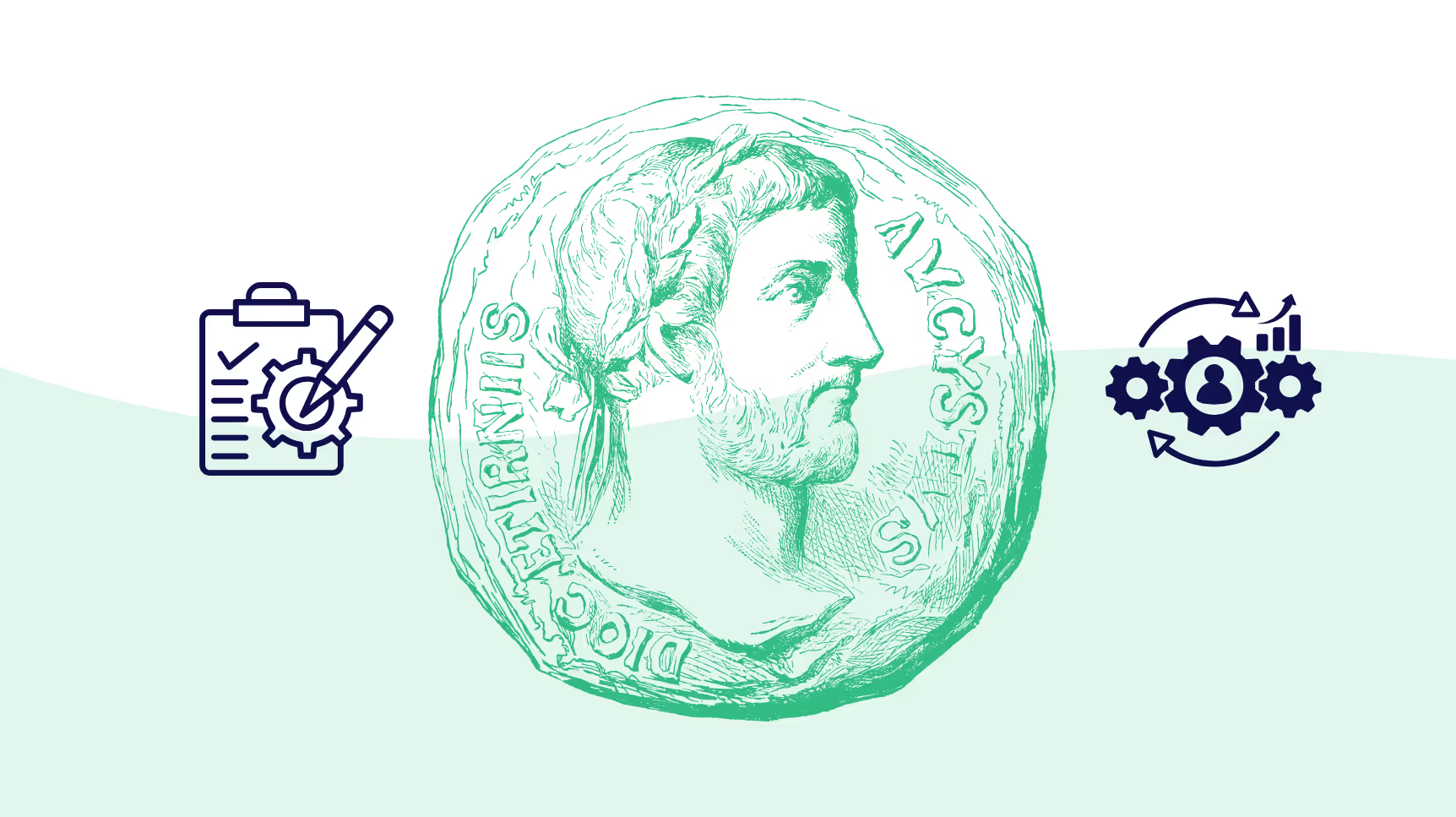
Julius Caesar wasn’t known for quality assurance.
But he was known for clarity, documentation, and a leadership style rooted in accountability, insight, and persuasive communication.
In fact, if he were running a contact center today, Caesar wouldn’t just use QA scorecards. He’d revolutionize them.
Because, as it turns out, the foundations of a great QA program include clear standards, strategic transparency, and timely feedback. These mirror the tactics that helped Caesar build an empire.
Let’s break it down, with a little help from the psychology of motivation, ancient military history, and modern performance science.
🧾 1. Clarity of Standards: “Veni, vidi, vici” (I came, I saw, I scored)
Caesar’s campaigns succeeded because his soldiers knew what was expected with no ambiguity.
He was a master of standardizing commands across vast regions, ensuring his legions operated with clarity.
QA scorecards thrive on the same principle.
According to Amabile & Kramer’s research (The Progress Principle), progress is a key motivator but only when the goals are clearly defined.
Yet many CX teams still use vague scorecard criteria like:
- “Use appropriate tone”
- “Own the conversation”
- “Show empathy”
Without operational definitions, these are interpretive at best and demotivating at worst.
💡 Caesar’s lesson: Define every metric clearly. Make your QA rubric a document of truth, not guesswork.
🏗️ 2. Structure with Flexibility: The Roman Legion as a Modular Team
Caesar’s armies were highly disciplined but also agile. Each cohort operated with autonomy, adjusting tactics on the fly within a broader framework.
Modern QA scorecards should work the same way:
- Core competencies apply to all agents (e.g. compliance, professionalism)
- Contextual elements vary by channel, campaign, or skill level
Research in performance enablement (Harvard Business Review, 2022) shows that systems perform best when they are structured but adaptable to role-specific conditions.
💡 Caesar’s lesson: Build your scorecard like a legion: rigorous in form, flexible in function.
🧠 3. Quantitative AND Qualitative Balance: The Commentarii Approach
Caesar’s Commentarii de Bello Gallico (“Commentaries on the Gallic War”) weren’t just field reports. They were carefully crafted narratives: factual, persuasive, and reflective.
A modern QA scorecard should be the same:
- Quantitative metrics (scores, checkboxes)
- Qualitative insights (narrative feedback, coaching notes)
According to CIPD’s Learning and Development Study (2023), combining numerical scores with open-ended feedback increases learning retention and behavior change by up to 40%.
💡 Caesar’s lesson: Document performance like it might be read by historians. Give agents the story behind the score.
⏳ 4. Timeliness Is Everything: Strike While the Call Is Hot
Caesar moved fast. He didn’t wait for ideal conditions. He seized opportunities in real time. His letters, reforms, and battlefield decisions were all marked by speed of action.
Delayed QA feedback is like a battle report sent weeks after the war is over. The brain has moved on.
B.J. Fogg’s research on behavior change shows that the shorter the feedback loop, the more likely a habit will form.
Modern platforms (like Leaptree 👀) make it possible to deliver near-instant feedback after a call, email, or chat interaction when it matters most.
💡 Caesar’s lesson: Act fast. Feedback delayed is impact denied.
🫂 5. Scorecards Are for Strategy, Not Surveillance
Despite being a military dictator, Caesar often led with persuasion, not fear. His reforms earned him loyalty from both soldiers and citizens. His leadership wasn’t just about authority. It was about strategy and trust.
The same applies to scorecards.
If agents view QA as a “gotcha” tool, they’ll resist it. But if scorecards are used to:
- Drive growth
- Spot strengths
- Align to team goals
- Personalize coaching…
…they become a strategic enabler, not a performance hammer.
Amy Edmondson’s work on psychological safety shows that trust is the foundation for all meaningful feedback cultures.
💡 Caesar’s lesson: QA should unite your team around excellence not divide them with fear.
🏛️ Final Thought: Not All Scorecards Are Created Equal
Caesar once said, “Experience is the teacher of all things.”
But we’d argue: well-structured QA scorecards are a close second.
Because when done right, a scorecard isn’t just a form.
It’s a philosophy of growth, communication, and continuous improvement.
So go ahead. Channel your inner Caesar.
✍️ Clarify expectations
📊 Balance metrics and meaning
🧠 Coach like a strategist
🗣️ Act quickly, honestly, and with purpose
And most importantly don’t just record what happened.
Write the story of what’s next.
📚 References
- Amabile, T. M., & Kramer, S. J. (2011). The Progress Principle: Using Small Wins to Ignite Joy, Engagement, and Creativity at Work. Harvard Business Review Press.
- Edmondson, A. C. (1999). Psychological Safety and Learning Behavior in Work Teams. Administrative Science Quarterly, 44(2), 350–383.
- Fogg, B. J. (2019). Tiny Habits: The Small Changes That Change Everything. Houghton Mifflin Harcourt.
- Harvard Business Review (2022). Performance Enablement: Building Systems That Drive Growth.
- CIPD (2023). Learning and Development: Leveraging Feedback for Organizational Performance.
- Goldsworthy, A. (2006). Caesar: Life of a Colossus. Yale University Press.
- Caesar, J. (c. 50 BCE). Commentarii de Bello Gallico.
